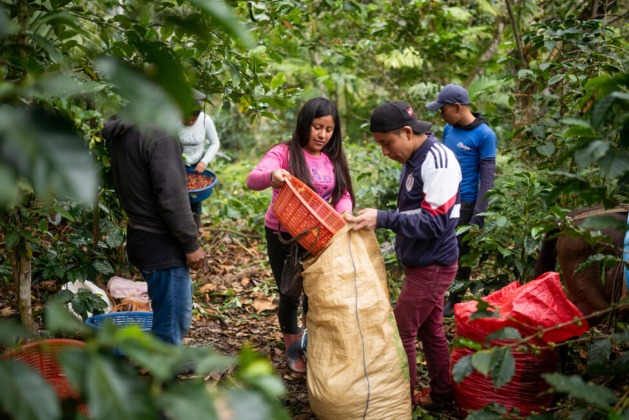ROME, Sep 3 (IPS) – Marco Knowles leads the Social Protection Team at the FAODurgent climate action is essential to eradicate hunger and poverty, but climate mitigation policies may inadvertently exacerbate these problems in rural areas. Countries must design climate strategies that take into account the impact on the rural poor and include social protection measures.
Last July we were confronted with alarming statistics: 733 million people went hungry in 2023which is equivalent to one in eleven people worldwide. In Africa it was even higher, with one in five people going hungry. Climate change is a major cause of this crisis.
Paradoxically, well-intentioned Policies to combat global warming can also be a cause of hungerparticularly for small-scale farmers in poorer countries, unless these policies are accompanied by measures to reduce their socio-economic disadvantages.
Gradual changes in temperature and rainfall patterns reduce the yield of agriculture, on which poor people largely depend. In addition, sudden events such as floods and droughts devastate their crops and livestock. According to the World BankClimate change could push as many as 135 million more people into poverty by 2030. Urgent action to combat climate change is therefore essential in the fight against poverty and hunger.
However, if we are not careful, climate mitigation efforts could undermine progress in eradicating poverty and hunger. A recent example is the European Union Regulation on Deforestation-Free Products which was introduced in June 2023. This regulation aims to ensure that products bought and consumed in Europe do not contribute to deforestation through the expansion of agricultural land for livestock, timber, cocoa, soy, palm oil or coffee production.
On the one hand, reducing deforestation is essential for the fight against climate change and could benefit many of the 1 to 2 billion people who depend on forests for their livelihood.
But on the other hand, the costs of these policies fall disproportionately on poor rural people who lack the resources and capabilities to adhere to them, including those who currently rely on clearing new land for their livelihoods – estimated to account for about a third of deforestation.
If governments of 17 countries In Latin America, Africa and Asia, people had already warned that the EU regulation was already having serious negative consequences for poorer people in poorer countries, especially small-scale farmers.
Without support, they face enormous challenges in complying with the complex new procedures, and at the same time often lack the capacities and resources to maintain or increase their agricultural production without expanding the cultivated land area. This is especially true in a context of a changing climate that reduces agricultural yields.
While progress on the climate agenda must continue at a rapid pace, the socio-economic trade-offs of climate policies for different population groups – especially the most vulnerable – must be considered from the outset. Countries, especially those where poverty and hunger are concentrated, must be supported and encouraged to link green policies with measures that enable smallholder farmers to adapt to new circumstances or to transition to new and dignified livelihoods.
Social protection – which includes policies and programmes aimed at addressing poverty and vulnerability – can play an important role in facilitating these transitions. In the short term, by providing regular cash payments to offset any negative social impacts of climate policies, and in the longer term, by combining these payments with technical support, skills training and livelihood interventions that can help people adapt to and thrive under new policy regimes.
This approach is already being used in several countries.
In ChinaA forest protection law affected about one million public forest workers and 120 million rural households by restricting access to forest resources. To mitigate these impacts, government workers were provided with assistance such as employment services, unemployment benefits, and pension schemes. As a result, two-thirds of the affected workers were redeployed to alternative jobs or retired, while 124 million households benefited from income transfers.
In Brazil and Paraguay, social protection and complementary agricultural programs support rural households to adopt more sustainable and profitable agricultural practices. Poverty, reforestation, energy and climate change (PROEZA) program, provides households participating in the country’s main social protection system, Tekoporawith technical support and additional funding. Thanks to this, small-scale farmers are adapting their agricultural practices to better withstand increasingly frequent droughts, while also increasing their production of native crops such as yerba mate.
In the same way, in Brazilthe Green Bolsa program provides cash payments to beneficiaries of the national social cash transfer program, Family bag, in exchange for preserving or restoring forests, protecting water sources and promoting sustainable agriculture.
Governments should be encouraged and supported to implement and scale up social protection measures to ensure that the poorest and most vulnerable people do not bear the burden of tackling the climate crisis and to green the consumption of people in richer parts of the world.
We must therefore prioritise an approach that pays close attention to the social and environmental impacts of policies to address climate change. Social protection programmes play a crucial role in building a future that is mutually beneficial for people and planet.
Marco Kennes leads FAO’s Social Protection Team. His areas of expertise include increasing access to social protection in rural areas and leveraging social protection for climate action. He also has substantial experience in providing evidence-based food security policy support and capacity development support.
© Inter Press Service (2024) — All rights reservedOriginal source: Inter Press Service

